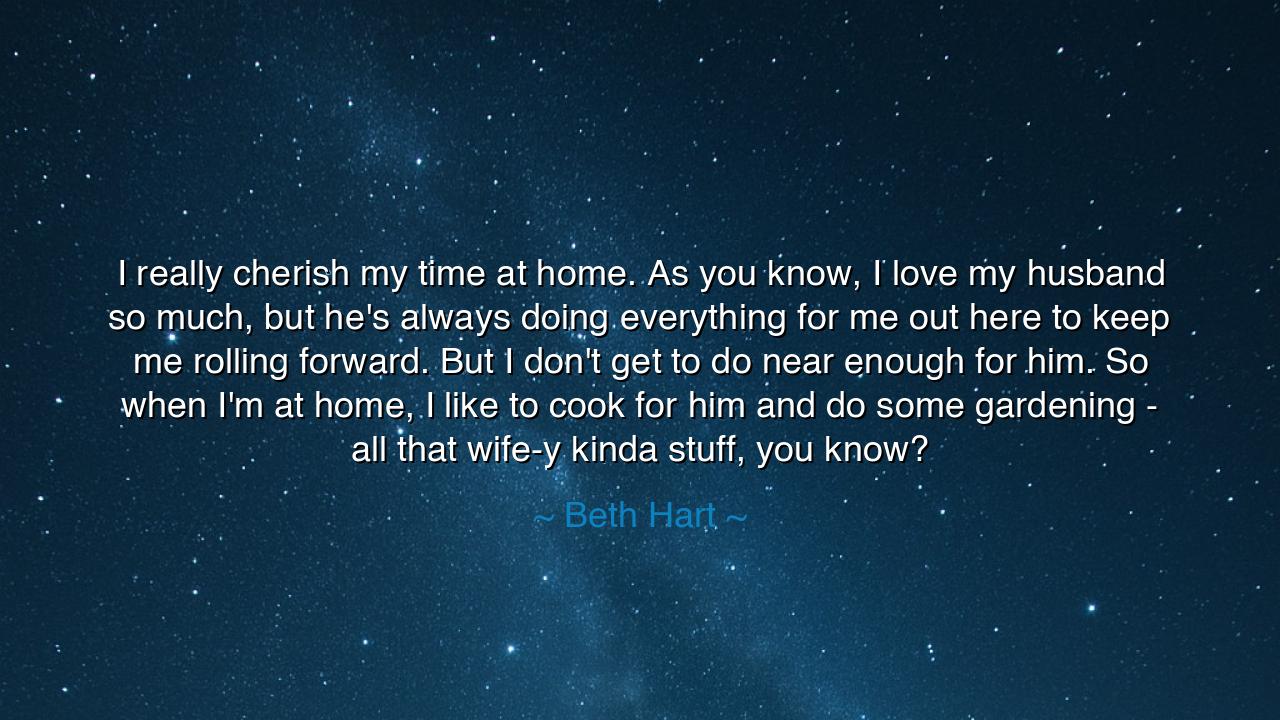
I really cherish my time at home. As you know, I love my husband
I really cherish my time at home. As you know, I love my husband so much, but he's always doing everything for me out here to keep me rolling forward. But I don't get to do near enough for him. So when I'm at home, I like to cook for him and do some gardening - all that wife-y kinda stuff, you know?






“I really cherish my time at home. As you know, I love my husband so much, but he's always doing everything for me out here to keep me rolling forward. But I don't get to do near enough for him. So when I'm at home, I like to cook for him and do some gardening — all that wife-y kinda stuff, you know?” — in these heartfelt words, Beth Hart, the soulful singer whose voice carries both fire and tenderness, reveals a truth as old as love itself: that even amidst fame and motion, the heart yearns for stillness, service, and the sacred intimacy of home. Beneath her simple confession lies a profound wisdom — that love is not measured by grand gestures, but by quiet acts of care, that the greatness of a soul is not only in what it achieves for the world, but in how it tends to the ones who make that achievement possible.
The origin of this quote comes from Beth Hart’s reflections on her life as a touring musician — a life lived in constant movement, surrounded by crowds, sound, and spotlight. Yet behind the stage lights and applause, she found herself most fulfilled in the soft rhythm of domestic life — gardening, cooking, and nurturing. Her words arise from a deep sense of gratitude toward her husband, who, as she says, “keeps her rolling forward.” To her, love is not a transaction but a balance — the giving and receiving of devotion in its purest, most human form. The stage may give her glory, but home gives her peace. And in that peace, she reclaims something eternal: the joy of serving the one who serves her.
The ancients, too, understood this sacred exchange. In the stories of old, the warrior who conquered kingdoms returned home not to rule, but to rest his head upon the heart that steadied him through battle. So too in Beth Hart’s words we hear the echo of those timeless rhythms — that love, to endure, must move in both directions. The hand that supports must also be supported; the one who shines must also be nurtured in return. When she cooks, when she tends her garden, she is not merely performing chores — she is worshipping through simplicity, expressing love not with words or wealth, but with presence.
Think of Odysseus and Penelope, the hero and the weaver. While Odysseus wandered through storms and wars, Penelope kept the home, her patience and faith the unseen pillar of his strength. And when he returned, scarred and weary, she did not greet him as a queen greets a king, but as one heart recognizing another. Their love was not forged in triumphs, but in endurance — in the quiet, steadfast labor of waiting and giving. Beth Hart’s sentiment carries that same eternal melody: that home is not a place of rest alone, but of restoration — where love, through humble acts, is made whole again.
There is also a beautiful humility in her confession. She does not speak from pride, but from an awareness that love is not about equality in measure, but about generosity in spirit. “He’s always doing everything for me,” she says, and in that simple acknowledgment lies the heart of gratitude. Many chase greatness in the world yet forget to honor the unseen sacrifices that make their journey possible. Hart reminds us that even the brightest flame is kept alive by the unseen hand that shields it from the wind. The gardening she speaks of is not only of flowers and soil, but of the heart — the cultivation of gratitude and tenderness in the soil of shared life.
From her words, we also learn that service is not servitude; it is strength. To serve the one you love is not to diminish yourself, but to complete yourself. When Beth Hart says she loves to “do some gardening and all that wife-y kinda stuff,” she is not reducing her worth, but reclaiming it — grounding her fame in humanity, her power in love. In a world that celebrates the extraordinary, she celebrates the ordinary, and in doing so, elevates it. For what is greatness, if it cannot return to simplicity? What is success, if it cannot bend down to tend the garden of love?
So, my child, take this lesson into your life: cherish the small acts of love, for they are the true miracles of existence. Do not despise the quiet moments — the cooking, the cleaning, the listening, the caring — for in them lies the essence of all devotion. Greatness without tenderness is hollow; achievement without gratitude is fleeting. Remember that the heart grows not in applause, but in service.
When you return home from the world’s battles, lay down your armor and pick up gentleness. Tend to your loved ones as to sacred soil. Speak gratitude aloud. Give more than you think you owe, and you will find yourself richer than before. For as Beth Hart reminds us, love’s highest art is not in conquering, but in cherishing — not in taking, but in giving. And when you serve in love, the home becomes not just a dwelling, but a temple — and the heart, the altar where peace and gratitude abide forever.






AAdministratorAdministrator
Welcome, honored guests. Please leave a comment, we will respond soon